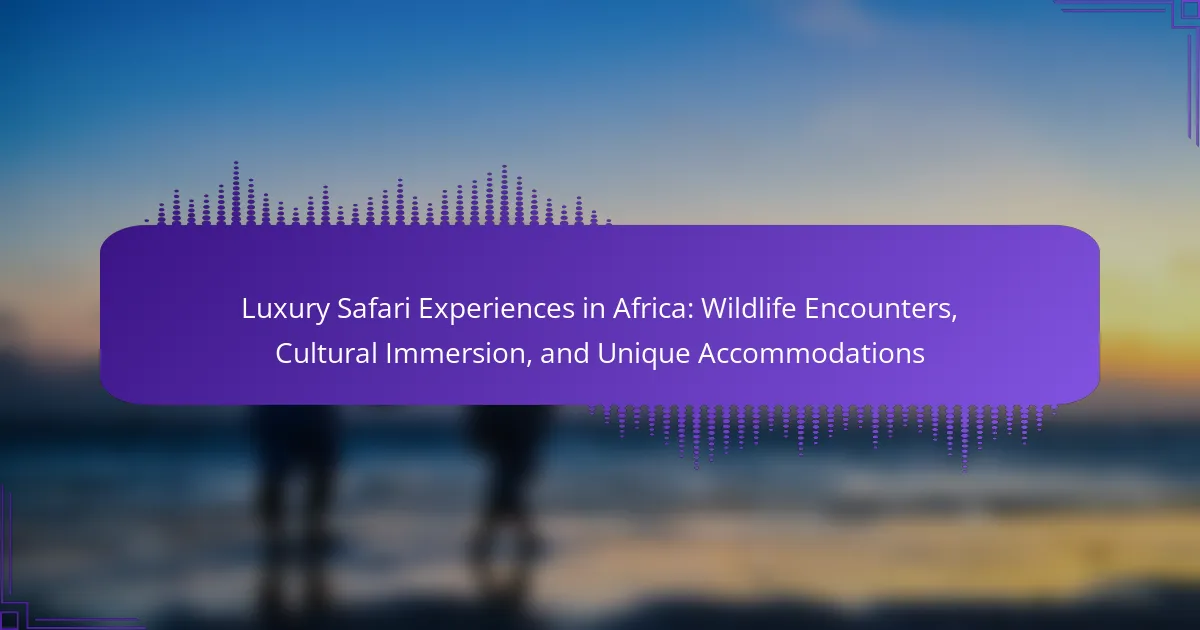Luxury safari experiences in Africa offer unforgettable wildlife encounters, cultural immersion, and unique accommodations. Witness the “Big Five” in their natural habitats while guided by expert trackers. Engage with local communities to gain insights into their traditions and conservation efforts. Stay in luxury tented camps or exclusive lodges that provide comfort without sacrificing the wild essence of Africa.
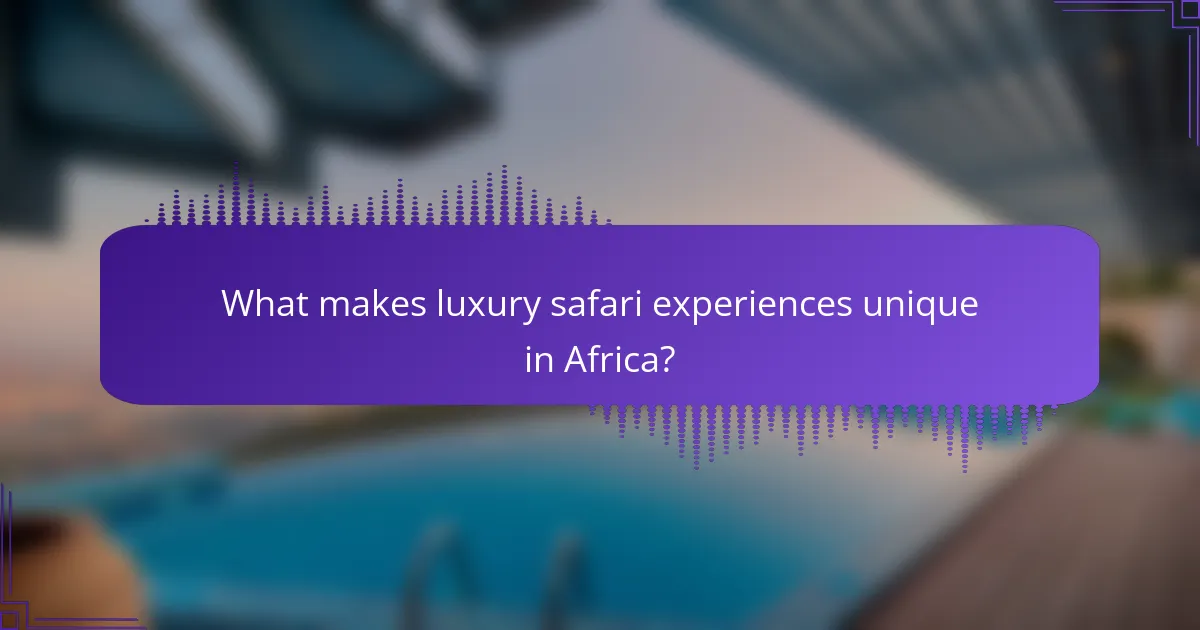
What makes luxury safari experiences unique in Africa?
Luxury safari experiences in Africa are unique due to their exceptional wildlife encounters, cultural immersion, and bespoke accommodations. These safaris offer intimate wildlife interactions, often guided by expert trackers. Guests can witness the “Big Five” in their natural habitats, enhancing the thrill of the experience.
Cultural immersion is another hallmark, with opportunities to engage with local communities and learn about their traditions. This adds depth to the safari, transforming it into a holistic journey. Unique accommodations, such as luxury tented camps and exclusive lodges, provide comfort while maintaining a connection to nature.
These elements combined create an unparalleled adventure that blends luxury with the wild essence of Africa.
How do luxury safaris differ from traditional safaris?
Luxury safaris offer personalized experiences and upscale amenities, while traditional safaris focus on basic wildlife viewing. Luxury safaris include private guides, gourmet dining, and exclusive accommodations, enhancing comfort and immersion. Traditional safaris typically feature group tours, standard lodgings, and less tailored itineraries. The unique attribute of luxury safaris is the emphasis on high-end service and unique cultural interactions, creating a more intimate connection with the environment.
What are the key elements of a luxury safari experience?
A luxury safari experience encompasses exclusive wildlife encounters, cultural immersion, and unique accommodations. Key elements include personalized guided tours, gourmet dining options, and opulent lodges or tented camps.
Wildlife encounters feature private game drives, ensuring close proximity to animals while maintaining comfort. Cultural immersion involves engaging with local communities through curated experiences, enhancing understanding of traditions. Unique accommodations offer lavish amenities, such as private pools and spa services, elevating the overall experience.
These elements combine to create a memorable adventure, blending nature and luxury seamlessly.
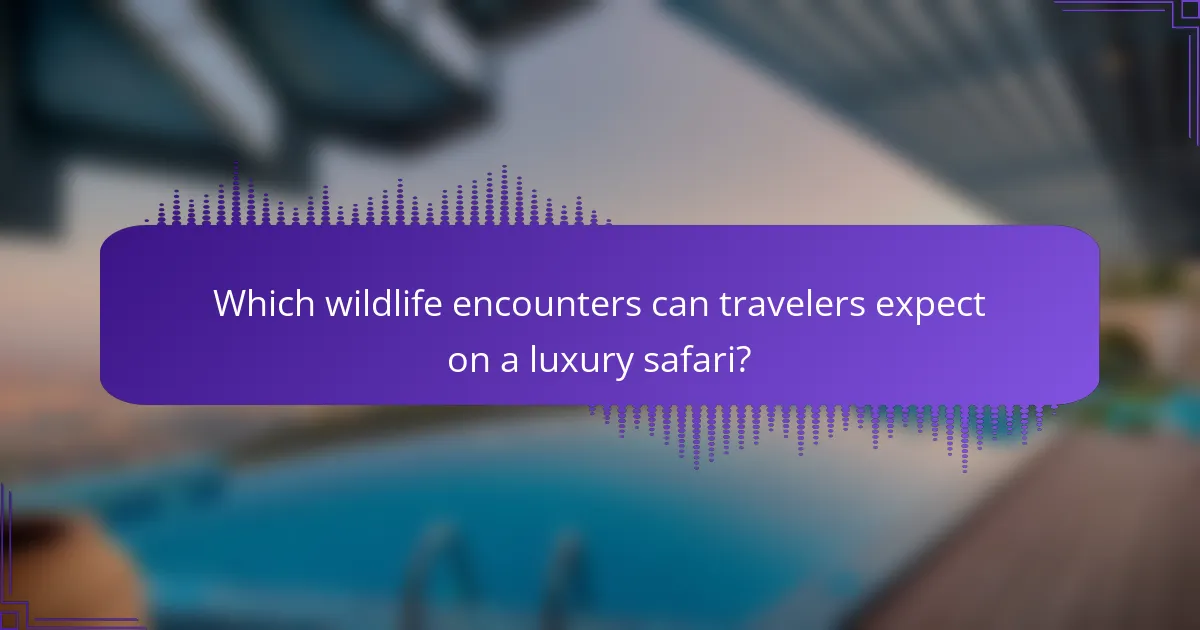
Which wildlife encounters can travelers expect on a luxury safari?
Travelers can expect diverse wildlife encounters on a luxury safari, including elephants, lions, and rhinos. Luxury safaris often feature guided game drives, offering close-up views of these majestic animals in their natural habitats. Unique experiences may include walking safaris and night drives, enhancing the adventure. Cultural immersion with local tribes adds depth to the journey, providing insights into wildlife conservation efforts. Exclusive accommodations, like luxury lodges and tented camps, ensure comfort while experiencing the wild.
How do guided wildlife tours enhance the experience?
Guided wildlife tours significantly enhance the experience by providing expert knowledge and ensuring safety during encounters. These tours offer insights into animal behavior and local ecosystems, enriching the overall understanding of wildlife. Additionally, they facilitate cultural immersion by connecting travelers with local communities and traditions. Unique accommodations, often luxurious and eco-friendly, further elevate the safari experience, allowing guests to enjoy nature without sacrificing comfort.
What are the most sought-after animal sightings?
The most sought-after animal sightings during luxury safaris in Africa include the Big Five: lions, elephants, leopards, buffalo, and rhinoceros. These iconic animals represent the pinnacle of wildlife encounters, attracting travelers seeking unforgettable experiences. Additionally, sightings of cheetahs, giraffes, and various antelope species are highly desired. Unique attributes, such as the seasonal migration of wildebeest in the Serengeti, further enhance these experiences. Cultural immersion through local guides enriches the adventure, providing insights into the ecosystems and conservation efforts surrounding these remarkable species.

How does cultural immersion enrich luxury safari experiences?
Cultural immersion significantly enhances luxury safari experiences by providing authentic connections with local communities. Engaging with indigenous cultures allows travelers to gain insights into traditional practices, enhancing their understanding of the region’s heritage. Unique attributes, such as guided village visits or artisan workshops, enrich the journey beyond wildlife encounters. As a result, guests experience a deeper appreciation for the landscapes and wildlife, making their safari memorable and transformative.
Which local communities can visitors engage with during their safaris?
Visitors can engage with diverse local communities during their safaris, enhancing their cultural immersion. For example, in Kenya, the Maasai people offer insights into their traditions and lifestyles. In Tanzania, the Hadzabe tribe provides a unique experience of hunter-gatherer culture. South Africa’s Zulu communities showcase vibrant music and dance. Each interaction allows visitors to appreciate local customs while supporting sustainable tourism initiatives. Engaging with these communities enriches the safari experience, fostering deeper connections with the region’s heritage.
What cultural activities are typically included in luxury safari packages?
Luxury safari packages typically include cultural activities such as village visits, traditional dance performances, and local artisan workshops. These experiences enhance wildlife encounters by providing insight into the indigenous communities and their customs. Guests may interact with local tribes, learn about their traditions, and participate in ceremonies, creating a deeper connection to the region. Unique accommodations often complement these activities, offering a blend of comfort and cultural immersion.

What types of unique accommodations are available on luxury safaris?
Luxury safaris offer unique accommodations such as luxury tented camps, treehouses, and private villas. These options provide immersive experiences in nature while ensuring comfort and exclusivity. Luxury tented camps blend elegance with the wilderness, featuring en-suite bathrooms and gourmet dining. Treehouses offer stunning views and a unique perspective on wildlife. Private villas provide personalized services and amenities, catering to individual preferences. Each type enhances the safari experience, allowing guests to connect with the environment while enjoying luxury.
How do luxury lodges and tented camps compare in terms of amenities?
Luxury lodges typically offer more amenities than tented camps, focusing on comfort and luxury. Lodges often feature en-suite bathrooms, air conditioning, and gourmet dining. Tented camps provide a more rustic experience with fewer amenities but often emphasize a closer connection to nature.
| Feature | Luxury Lodges | Tented Camps |
|———————-|——————————|—————————–|
| Bathroom Type | En-suite | Shared or private |
| Dining Experience | Gourmet meals | Campfire dining |
| Room Size | Spacious | Compact |
| Air Conditioning | Common | Rare |
| Wildlife Interaction | Limited to lodge grounds | Closer encounters |
| Ambiance | Elegant and sophisticated | Natural and adventurous |
What are the most exclusive accommodations in Africa’s safari regions?
Some of the most exclusive accommodations in Africa’s safari regions include luxurious lodges and tented camps that offer unparalleled wildlife experiences. These establishments often feature private game drives, gourmet dining, and personalized service. Notable examples are Singita Grumeti in Tanzania, known for its opulence and conservation efforts, and the luxurious Royal Malewane in South Africa, which provides intimate wildlife encounters. Each accommodation emphasizes unique attributes such as secluded locations, bespoke experiences, and cultural immersion, ensuring guests enjoy a memorable stay amidst Africa’s breathtaking landscapes.
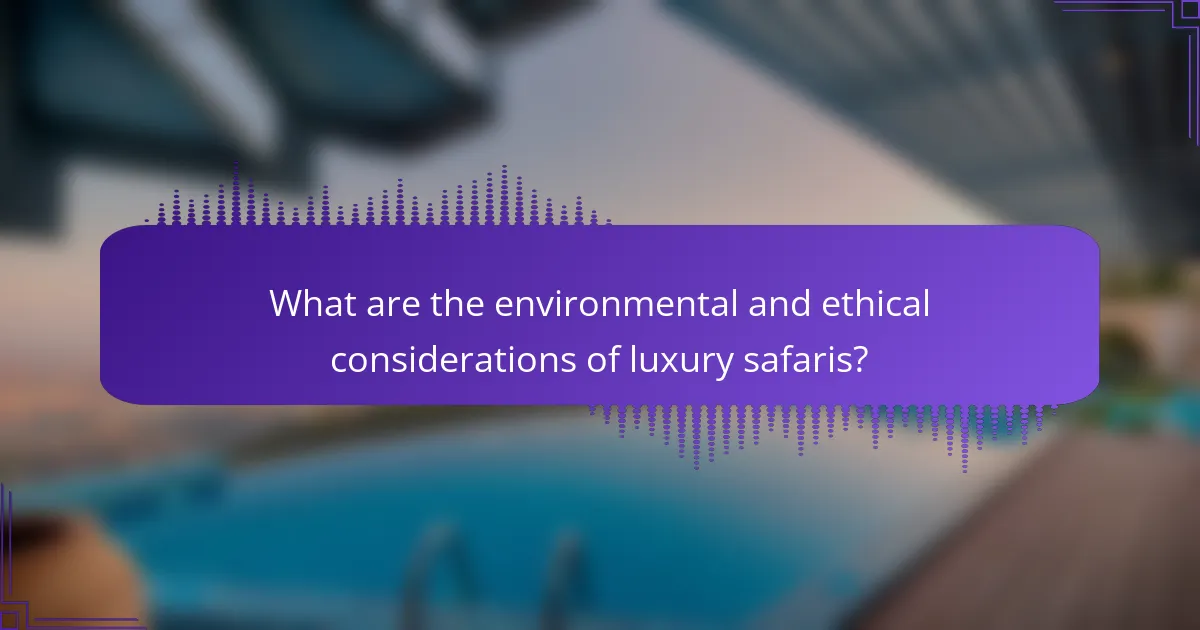
What are the environmental and ethical considerations of luxury safaris?
Luxury safaris can have significant environmental and ethical implications. They often promote wildlife conservation but may also contribute to habitat disruption and cultural commodification.
Luxury safari experiences frequently invest in local communities, providing jobs and supporting conservation efforts. However, the influx of tourists can strain local resources and alter traditional lifestyles.
Sustainable practices are essential in luxury safaris to minimize ecological footprints. Some operators implement eco-friendly accommodations, wildlife protection measures, and community engagement initiatives.
Ultimately, balancing luxury tourism with ethical considerations is crucial for preserving Africa’s natural beauty and cultural heritage while ensuring a positive impact on local communities.
How do luxury safari operators promote sustainable tourism?
Luxury safari operators promote sustainable tourism by implementing eco-friendly practices, supporting local communities, and preserving wildlife habitats. They often utilize renewable energy sources, minimize waste, and offer educational programs for guests. For example, many lodges source food locally, reducing carbon footprints and enhancing cultural immersion. This approach not only benefits the environment but also enriches the luxury safari experience by connecting travelers with the region’s heritage.
What challenges do luxury safaris face regarding wildlife conservation?
Luxury safaris face significant challenges in wildlife conservation, including habitat destruction, poaching, and human-wildlife conflict. These factors threaten the sustainability of ecosystems and the species that inhabit them. Luxury tourism can sometimes contribute to environmental degradation if not managed responsibly. For example, increased foot traffic can disrupt wildlife and lead to habitat loss. Additionally, balancing the economic benefits of luxury safaris with the need for conservation efforts remains a complex issue. As a result, effective strategies are essential to ensure that luxury safaris support rather than hinder wildlife conservation initiatives.
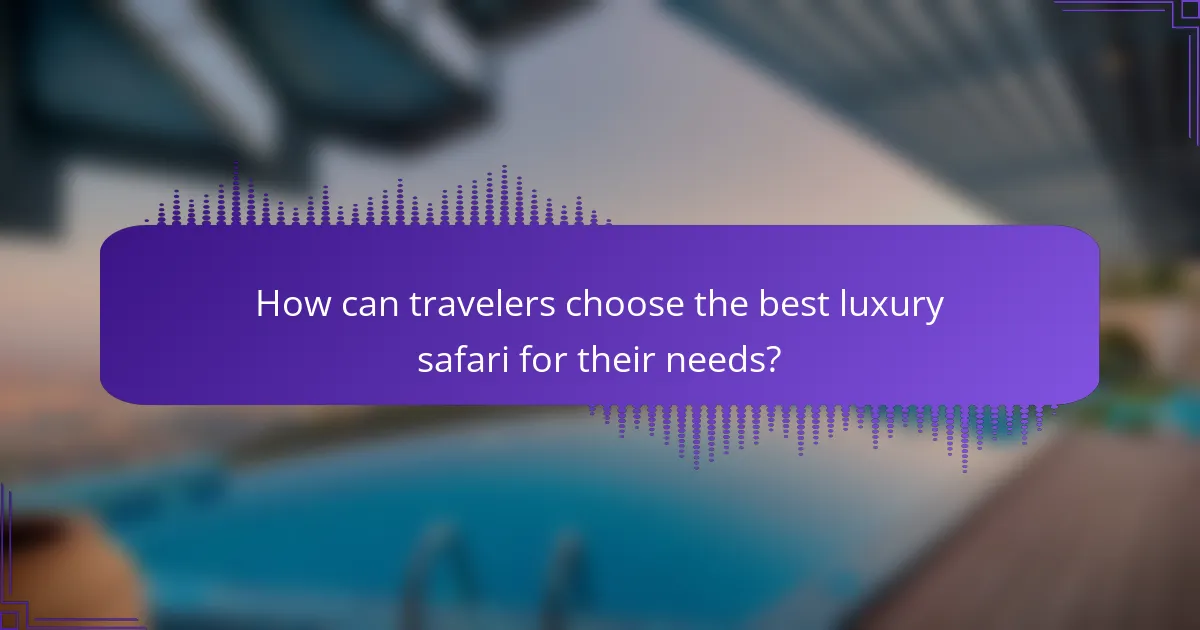
How can travelers choose the best luxury safari for their needs?
Travelers can choose the best luxury safari by assessing their interests, budget, and desired experiences. Start by identifying wildlife preferences, such as specific animals or landscapes. Consider cultural immersion opportunities, like local village visits or guided walks. Evaluate accommodation options, focusing on luxury lodges, tented camps, or exclusive private villas. Research safari operators for their reputation and services, ensuring they align with personal expectations. Finally, read reviews and seek recommendations to gauge past travelers’ experiences.
What factors should be considered when selecting a luxury safari operator?
When selecting a luxury safari operator, consider their reputation, safety standards, personalized services, and unique experiences offered. Research customer reviews and testimonials to gauge satisfaction. Evaluate their knowledge of local wildlife and cultural immersion opportunities. Ensure they provide high-quality accommodations and sustainable practices.
How do seasonal variations impact luxury safari experiences?
Seasonal variations significantly influence luxury safari experiences by altering wildlife visibility, climate conditions, and accommodation availability. During the dry season, animals congregate around water sources, enhancing wildlife encounters. In contrast, the wet season offers lush landscapes and unique migratory patterns. Cultural experiences may also vary, with local festivals occurring at specific times of the year. Luxury accommodations often adjust their offerings and pricing based on these seasonal changes, impacting overall guest experiences.
What are common mistakes to avoid when planning a luxury safari?
To avoid common mistakes when planning a luxury safari, focus on thorough research, timely booking, and understanding local customs. Many travelers overlook the importance of selecting the right season for wildlife viewing. Failing to account for travel logistics can also lead to missed experiences. Additionally, not considering accommodation quality may detract from the luxury experience. Always prioritize reputable tour operators to ensure a seamless adventure.
What expert tips can enhance the luxury safari experience?
To enhance the luxury safari experience, prioritize personalized itineraries, exclusive access to wildlife, and unique accommodations.
1. Choose private game drives for intimate wildlife encounters.
2. Opt for guided cultural tours to engage with local communities.
3. Select luxury lodges or tented camps that offer unique amenities.
4. Incorporate wellness activities like spa treatments in nature.
5. Plan for gourmet dining experiences featuring local cuisine.
6. Schedule night safaris for a different perspective on wildlife.
